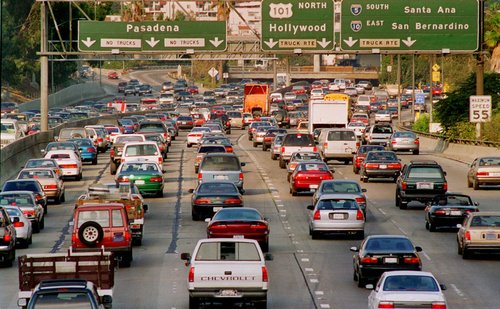Sensitive individuals such as children, the elderly, and people with respiratory conditions such as asthma, are considered to be at high risk when the AQI reaches 100; anything above 400 is considered extremely hazardous. Beijing's dark January day was nearly twice that level. Another metric, the PM2.5 level (which measures the amount of particulate matter 2.5 microns or smaller, hazardous because of how these small particles accumulate in the lungs), was recorded at nearly 35 times higher than the World Health Organization's hazardous level.
So it can get bad. While other factors contribute to high AQIs, such as heavy industry and the widespread burning of coal and wood in outlying areas, transportation contributes its fair share to the black skies. And vehicular emissions are the leading source of the lung-infiltrating PM2.5, accounting for an estimated 22% of the atmospheric load.
It may seem strange that a population of millions would accept such deplorable conditions, especially when one of the main sources is such a visible part of the landscape. In the US, highly visible pollution impacts have incited widespread public outcry and drastic changes in public policy - like how the 1969 Cuyohoga River fire sparked a movement that led to the first Earth Day, the establishment of the EPA and the passage of the Clean Water Act.
But for the Chinese, driving a car is seen as a necessary sign of status in a newly prosperous economy. The Chinese government, despite enacting several policies to reign in the driving riot, encourages buying cars as a way to drive the economy and provides loans and incentives for would-be car owners. And the worse the vehicular emissions get, the less people are willing to walk or bike. Most people prefer to drive on black air days to be enclosed inside of cars where air quality may be slightly better.
Despite some forward-thinking policies on vehicular policies that have been put forward in the past 5 years, the thick smog of this past January 12th made it crystal clear that these measures are not doing enough.
- Rebecca Hamilton
Some cool sources!


The articles you linked to were both great reads. I think it's interesting that Los Angeles, while far from the severity of Beijing's air pollution, still has yet to reach it's air pollution goal after 60 years. It makes you wonder how long it will take for China, and Beijing in particular to reduce the amount of particulates in their air.
ReplyDeleteThere was also a recent report by the New York Times that said that air pollution was linked to over a million deaths in China in 2010. Beijing's major problem does not seem to be cars, yet, but the huge increase in the amount of vehicles the population is able to afford will not help the situation. It will be interesting to see if the top-down model will be able to work in this situation.
The Huffington Post article had a quote from a subway train driver saying "To be honest, the more the air is polluted, the more I prefer to drive, as I don't like taking a crowded bus or walking outside in such bad air."
ReplyDeleteThis an understandable position. The more cars are catered towards, the less people feel safe using alternative modes. As the speaker mentioned last monday, a way to prevent inhalation of particulates is to stay inside.
Creating a feeling of safety and preventing exposure to car emissions I feel is necessary to be successful in the areas of alternative modes of transportation. Unfortunately I don't feel this way in Portland yet, and as a result I drive more.